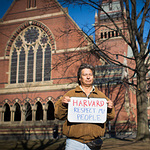 美國哈佛大學校長Drew Faust7日邀請校友和合作夥伴捐款,為氣候變遷解決方案研究基金(Climate Change Solutions Fund)籌募2千萬美元,以加速再生能源轉型的研究,並為氣候變遷挑戰下的創新方法鋪路。
美國哈佛大學校長Drew Faust7日邀請校友和合作夥伴捐款,為氣候變遷解決方案研究基金(Climate Change Solutions Fund)籌募2千萬美元,以加速再生能源轉型的研究,並為氣候變遷挑戰下的創新方法鋪路。
今明年撥1百萬 哈佛鼓勵再生能源研究
氣候變遷研究基金屬於哈佛大學能源與環境研究基金的一部分,該基金目前已釋出高達1億2千萬美元的研究經費,以支持氣候變遷研究基金。
Faust表示,2014至2015學年度開學時將撥款1百萬美元,正式啟動此基金,鼓勵有創新想法的哈佛教員和學生申請。
Faust在寫給哈佛社群的信中提到,很多大學已就氣候變遷威脅的科學共識,發表了大量的研究。「想法、創新、發現和嚴謹的獨立思考將是對抗氣候威脅不可或缺的元素,也是大學的基本精神。」
全哈佛有超過250堂環境永續性相關課程,哈佛環境中心有超過225位教員。「哈佛在氣候科學、工程、法律、公衛、政策、設計和商業方面有卓越的研究能力,能加速從傳統能源轉型成再生能源。」Faust說。
全部持股公司不顧環境 阿根廷居民親至哈佛抗議
由哈佛所有的EVASA和Las Misiones兩間公司在阿根廷的科連特斯開發人工林,而哈佛責任投資聯盟(The Responsible Investment at Harvard Coalition,RI@H)調查卻發現,這兩間公司竟在阿根廷破壞生態、違反地權和勞工權益。
2013年春天,RI@H啟動企業主責任活動,要求哈佛為其全部持股的公司負起道德責任,並發表調查報告、公開紀錄短片、去函哈佛行政單位,以及在哈佛校園展開抗議。
4月5日,來自哈佛人工林影響地區的兩位社群代表在RI@H的贊助下來到麻省劍橋市,將在為期一周的活動中向哈佛學生團體、行政單位和學生團體領袖說明他們的日常生活如何受到哈佛人工林的影響。
To catalyze research that could accelerate the transition to renewable sources of energy, Harvard President Drew Faust Monday challenged the university’s alumni and friends to contribute toward a $20 million Climate Change Solutions Fund that will “seed and spur” new approaches to confronting climate change.
The Climate Change Solutions Fund will be part of the Harvard Campaign’s broader ongoing efforts to raise funds for energy and environment research, which have already generated nearly $120 million in support.
Faust said that she will make available $1 million at the start of the 2014-15 academic year to launch the fund.
The fund will invite grant proposals from faculty and students across Harvard who have innovative ideas for projects that could help enable the transition from carbon-based to renewable fuels.
“Our research across Harvard – in climate science, engineering, law, public health, policy, design, and business – has an unparalleled capacity to accelerate the progression from nonrenewable to renewable sources of energy,” Faust said.
In a letter to the Harvard community, Faust noted that universities have produced much of the research upon which the scientific consensus on the threat of climate change is based.
“Ideas, innovation, discovery, and rigorous independent thought will serve as indispensable elements in combating the climate threat; these are the special province of universities,” she said.
Harvard’s commitment to these principles is being put to the test this week on campus. On Saturday, April 5, two organizers from the communities in Argentina most affected by Harvard’s timber plantations arrived in Cambridge for a week of action sponsored by the Responsible Investment at Harvard Coalition, RI@H.
In spring 2013, RI@H launched its responsible ownership campaign, demanding that Harvard take responsibility for the ethical practices of the companies it owns fully.
After learning of ecological, land rights, and labor rights violations in Corrientes, Argentina near the plantations of Harvard-owned companies EVASA and Las Misiones, RI@H published an investigative report and mini-documentary, delivered letters to Harvard administrators, and held demonstrations on campus.
Over the course of the week, the two delegates from Corrientes will speak to student groups, Harvard administrators, and student leaders about their experiences living in the shadow of Harvard’s plantations.
Across the university, more than 250 courses are offered that focus on aspects of environmental sustainability, and more than 225 faculty members are affiliated with the Harvard University Center for the Environment.
※ 全文及圖片詳見:ENS








